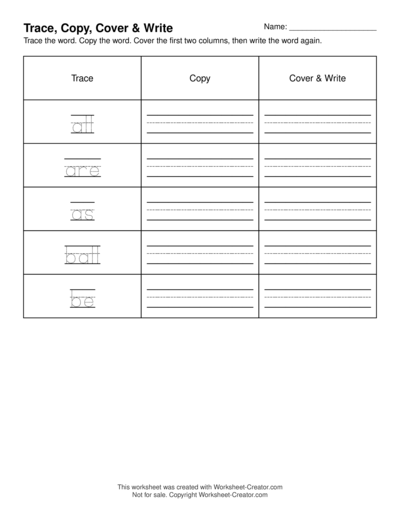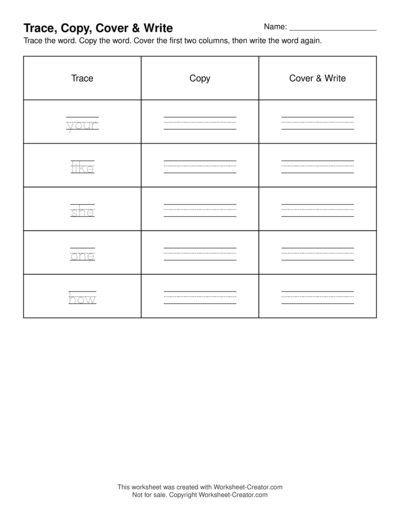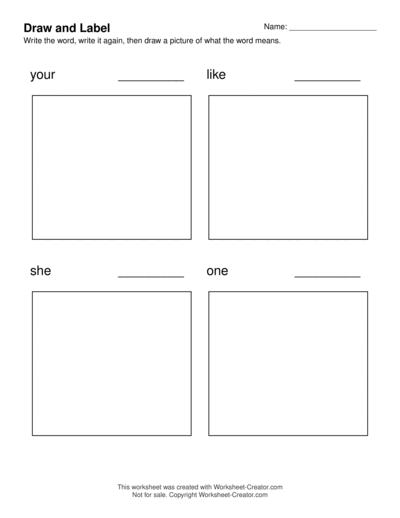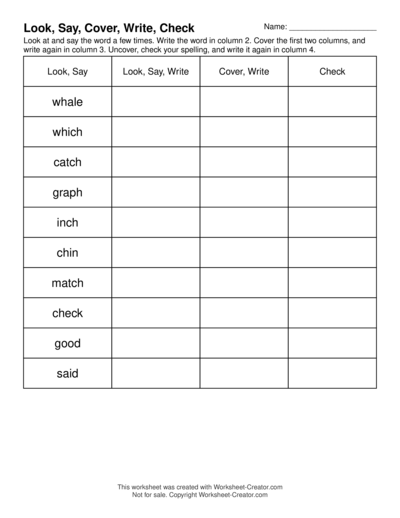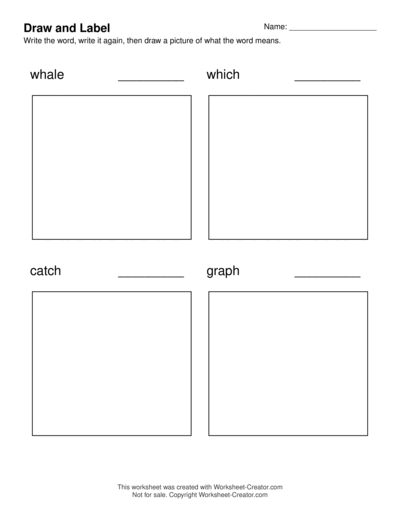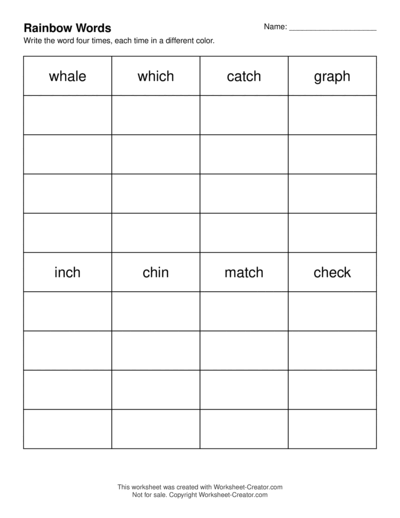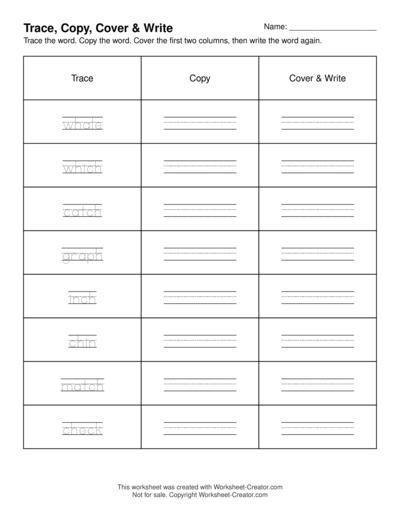Kindergarten Worksheets
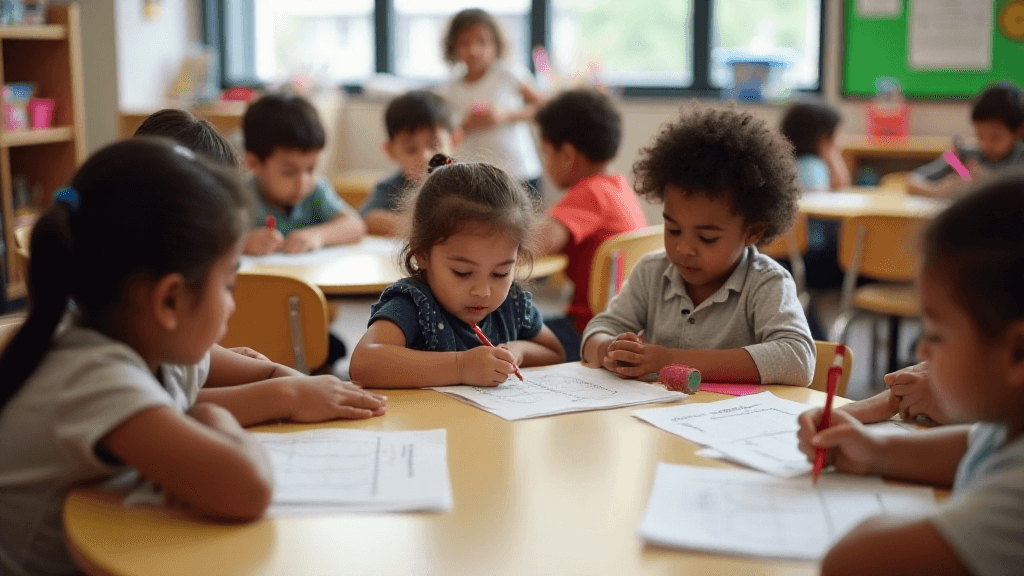
Kindergarten Worksheets Store
Here are ELA, Phonics, and Early Literacy resources for Kindergarten. These are designed by teachers, and used in the classroom, today. You can add any of them to your account and customize them for free.
To download a single worksheet, you can purchase it for $2.99. Or, purchase a full year of worksheet downloads for $29.99.
Trace, Copy, Cover & Write
Words used: all, are, as, ball, be
For grade level: Kindergarten
Trace, Copy, Cover & Write
Words used: your, like, she, one, how
For grade level: Kindergarten
Created by: M. Provost
Draw and Label
Words used: your, like, she, one, how
For grade level: Kindergarten
Created by: M. Provost
Word Search Puzzle
Words used: Frustrated, Cool, Confused, Irritable, Bothered, Enormous, Interfered, Stationary, Abandon, Appeared, Predictions, Analyze, Dishonest, Impolite, Conflicted, Expanded, Preposition, Communicate, Historical, Command
For grade level: Kindergarten
Created by: B. Labouve
Word Search Puzzle
Words used: Frustrated, Cool, Confused, Irritable, Bothered, Enormous, Interfered, Stationary, Abandon, Appeared, Predictions, Analyze, Dishonest, Impolite, Conflicted, Expanded, Preposition, Communicate, Historical, Command
For grade level: Kindergarten
Created by: D. Haynes
Look, Say, Cover, Write, Check
Words used: whale, which, catch, graph, inch, chin, match, check, good, said
For grade level: Kindergarten
Created by: D. Haynes
Draw and Label
Words used: whale, which, catch, graph, inch, chin, match, check, good, said
For grade level: Kindergarten
Created by: D. Haynes
Rainbow Words
Words used: whale, which, catch, graph, inch, chin, match, check, good, said
For grade level: Kindergarten
Created by: D. Haynes
Trace, Copy, Cover & Write
Words used: whale, which, catch, graph, inch, chin, match, check, good, said
For grade level: Kindergarten
Created by: D. Haynes
Cloze Paragraph
Words used: sky, fly, might, right, find, child, bite, pie, use, cute, mule, huge, cube, unit, few
For grade level: Kindergarten
Created by: M. Hough
Cloze Paragraph
Words used: sky, fly, bite, like, cute, mule, this, chin, ship, chub, shun, thud, hush
For grade level: Kindergarten
Created by: M. Hough
Cloze Paragraph
Words used: sky, fly, bite, like, cute, mule, this, chin, ship, chub, shun, thud, hush
For grade level: Kindergarten
Created by: M. Hough
Kindergarten Worksheet Generators
Do you prefer to start by generating a worksheet from one of our templates by scratch? Here are our most popular options:
Letter & Sound Practice
- Trace, Copy, Cover & Write - Perfect for practicing letter formation and sight words
- Draw and Label - Early vocabulary and picture-word association
- Rainbow Words - Fun way to practice letter recognition and formation
Word Lists & Games
- 8 Words List - Perfect for creating spelling word lists and sorts
Why Worksheets Matter in Kindergarten
Kindergarten is a foundational year in a child's literacy journey. It's when students begin developing essential pre-reading and early literacy skills. The Science of Reading (SoR) research emphasizes the importance of systematic, explicit instruction in phonological awareness, letter recognition, and early phonics during this critical stage.
Worksheets, when designed thoughtfully, can be powerful tools in your Kindergarten classroom.
In a Kindergarten classroom, well-designed worksheets serve several important purposes:
- Skill Development: They provide practice for letter recognition, formation, and early phonics skills.
- Hands-on Learning: They give students opportunities to interact with letters and sounds in a structured way.
- Progress Monitoring: They help teachers identify which students need additional support with early literacy skills.
- Fine Motor Development: They support the development of pencil grip and letter formation.
- Confidence Building: They provide achievable, independent tasks that help build early literacy confidence.
What Makes a Good Kindergarten Worksheet?
Effective Kindergarten worksheets should have these characteristics:
- Simple, Visual Instructions: Use pictures and minimal text to explain activities.
- Large, Clear Print: Extra-large letters and numbers that are easy to see and trace.
- Ample Space: Plenty of room for young learners to practice writing.
- Visual Support: Include pictures and icons to support understanding.
- Handwriting Guides: Provide dotted lines and arrows for proper letter formation.
- Engaging Design: Use colors and simple graphics to maintain interest.
Tips for Using Worksheets Effectively in Kindergarten
- Model First: Always demonstrate the worksheet activity with the whole class before students begin.
- Keep it Short: 5-10 minutes of worksheet practice is usually sufficient for Kindergarten students.
- Make it Interactive: Use worksheets as part of a hands-on activity or game.
- Provide Support: Be available to help students who need guidance.
- Celebrate Success: Acknowledge effort and progress to build confidence.
Conclusion
When used thoughtfully, worksheets can be valuable tools in your Kindergarten classroom. They provide essential practice opportunities for early literacy skills, help build confidence, and support the development of crucial pre-reading abilities. Remember to choose worksheets that align with your curriculum's scope and sequence, and always use them as part of a balanced early literacy program that includes plenty of teacher-led instruction, hands-on activities, and authentic learning experiences.
